Book Reviews by Genre: Science Fiction
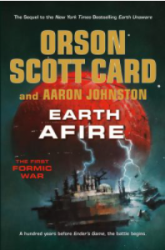
It's odd how the main ideas presented in the original Ender Saga have almost no depictions of combat or war in them at all. It is then appropriate that the second book in this prequel trilogy pulls out all the stops and shows what a horrific battle against ant-like aliens would be like in the not-to-distant future. After all, war is hell, and the atrocities committed by a species trying to terraform Earth to their specifications are quite gruesome.
Fortunately, Earth Afire does not focus too much on the gory details of war. There are still subplots being explored that bring realism to this doomsday scenario—like needing to go against orders and bureaucracy to save people. The reader finally gets to spend some significant time with Mazer Rackham, who is absolutely the most interesting character in this prequel trilogy. His story is where Earth Afire really shines. Sure, there are still some leftover characters from Earth Unaware who stick around to continue their plotlines, but the events happening on the ground are much more interesting than outer space sabotage.
While I feel Earth Afire has some strengths over its Earth Unaware, ultimately it's the downbeat middle book in a trilogy that focuses on the destruction of Earth. There is still hope for humanity with a few last-ditch efforts, but it's clear the Formics have the advantage on so many levels. Also, being a prequel book, Earth Afire suffers somewhat from the fact that we know what will happen to some of the main characters. They can't be killed off because they must ultimately win the day and stall the Formics long enough for Earth to launch their own counterattack.
A visceral image of alien war on Earth, I give Earth Afire 4.0 stars out of 5.
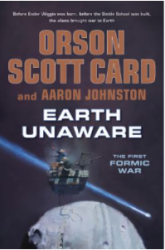
Prequels sometimes get a bad rap because they often feel unnecessary. If the story was important enough to start at the very beginning, then that's where the series should have started. Still, there is a comfort in prequels that comes from knowing what will happen. Little details that the reader knows will become important for the main part of the series act as subtle nods in the early stages of the series' lore. Earth Unaware is the first book in the Ender's Game prequel trilogy and flawlessly introduces the events that lead to the Earth's drastic response.
Orson Scott Card co-wrote Earth Unaware over a decade after publishing the first books in the Ender Saga. In that time, science advanced to the point where a near-future scenario like the one presented in Earth Unaware could be plausible. All the reader ever knew about the first Formic War from the original series was that the Formics invaded our planet without warning. The beautiful twist in this book is how a few miners out in the Kuiper Belt knew this threat was coming but had unexpected challenges that prevented them from warning Earth.
Unfortunately, the most realistic parts of this book had to do with corporate greed and an ignorant public (much like the plot for Don't Look Up (2021)). The action is certainly exciting and the stakes are quite high since Ender's Game already lets us know what will eventually happen. The only thing I'm disappointed in with this book is how little Mazer Rackham was involved. It was like the authors only mentioned him in passing to introduce him, even if he's arguably the most interesting character out of all the lore presented in Ender's Game.
A plausible, action-packed start to the Ender's Game prequel trilogy, I give Earth Unaware 4.0 stars out of 5.
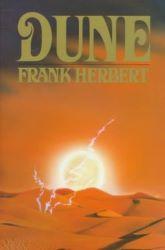
Dune is the first book in a series by Frank Herbert (something I didn't know until after I had started reading). This was a wonderfully imaginative book with interesting characters, conflict, and world building.
You follow Paul as he travels to the planet of Arrakis. You similarly follow those close to him, notably his mother, Jessica, as they all grow accustomed to the unfamiliar landscape and the politics that encompass it.
While the language of the characters originally threw me off, I grew accustomed to it and it helped immerse me in the story and characters. Seeing the dynamics and customs of not only the Atreides family, but also natives of Arrakis, was interesting and better as they intertwined with each other.
Also seeing the various themes of the story was also appealing (thanks English class!) as they intersect with each other in ways I've never seen before.
This is a great book and I recommend it, even if Sci-fi isn't your normal genre.
Reviewer's Grade: 11
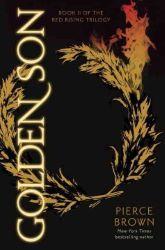
The second book in the Red Rising trilogy, Golden Son continues Darrow's quest to tear apart the Society from within. After having succeeded at the Institute, Darrow is now serving as a lancer in the House of Augustus. A Peerless Scarred of the Academy, his goal is to kill off the Bellona family before they kill him, and overthrow ArchGovernor Augustus of Mars. However, when a mishap throws his plan into jeopardy, Darrow finds himself leading a civil war among the Golds. While he's one step closer to overthrowing the tyrannical rule of the Golds, is at worth it at the cost of losing his friends, love, and loyalty?
Just like the first book, I couldn't set this one down once I started reading it! It's action packed and kept me on my toes the entire time, and the sci-fi elements were fantastical and literally out of this world. I like reading about Darrow's growth and how he's come to trust and see friendship in the Golds, and that while he's still fighting for the same purpose, he's opened his heart to the possibility of reforming the Golds rather than destroying them. Overall, the book is a great reference to power struggles and the inequity of class divisions. I loved all the allusions to Greek mythology, and the philosophical quotes and pieces. I can't wait to read book three and see Darrow's dream finally come true!

Dune is a sci-fi series written by Frank Herbert depicting detailed politics with twists and turns. The first one begins with the story of a boy called Paul, the son of a duke. His journey begins on Arrakis, a desert planet filled with a valuable resource called spice. When the duke’s palace is attacked, Paul must flee and find refuge in the desert. This book was entertaining for me, but it goes a little heavy into politics and there are a lot of things you need to pay attention to in order to understand the story. I lost interest in the overall series after the first 4 books as it just gets so weird with mystical stuff in the world. The genre it fits into is not scifi, but a mix between fantasy and scifi.
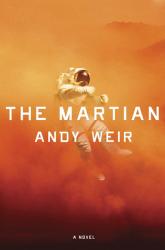
The Martian is a novel by Andy Weir about a lone astronaut trapped on a foreign planet, surviving solely off of his wits and knowledge. Andy Weir's premiere story is a tale of persistence, ingenuity, and the human need to help one another.
Mark Watney is an incredibly charismatic protagonist, and the fact that this is so obvious even without direct dialogue between him and other characters makes Weir's writing even more impressive. The format of the novel is unique, with Watney mostly speaking through logs of his time on Mars, before the perspective switches to his colleagues on Earth in a more common third person perspective. Although this format doesn't sound like it could be exciting, the book can be thrilling at times, as problems continue to stack up, making Watney's return to Earth more unlikely each time.
Overall, The Martian is a gripping story and a treat to adult fans of science fiction.
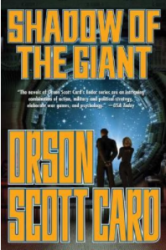
I'm glad Ender Wiggin's crewmates had this side series to explore their identities. While most of these characters were in the background of the Shadow series until now, Shadow of the Giant finally gives them time to shine on their own. After all, after three books focusing on Bean, it's nice to see the geopolitical drama unfold between these young tactical geniuses. I can definitely appreciate the storytelling that fills in the gaps between Ender's Game and Speaker for the Dead .
With Achilles being killed off in the previous book, Shadow Puppets , the principal antagonist of the series left a vacuum on the world stage that was inevitably going to be filled by Ender's Jeesh. And while these individuals had aged to the point of young adulthood, I can't deny the clever game they played with entire nations so they could position themselves in stations of power. It's entertaining to read about these military and political maneuvers in a fictional context, mostly because things would probably play out similarly in the real world if the situations presented themselves.
Still, Shadow of the Giant needs to include a side-plot with Bean. There's not much to say here other than it was an adequate stringing along that left room to conclude the series in the next two books. That being said, everything else about this series was so well wrapped up by the end of this volume that I'm sure Shadows in Flight won't have the same feel as the previous entries in this series without including Ender's Jeesh and Peter Wiggin's rule as Hegemon. If you want to stop reading the series here, I wouldn't blame you.
A great wrap-up of global affairs with room to continue Bean's story, I give Shadow of the Giant 4.0 stars out of 5.
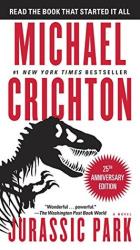
One of the greatest science fiction novels of the past century, Jurassic Park is a genius blend of thrills, likable characters, and philosophy deep enough to interest more mature readers while allowing younger adults and teenagers to be invested as well. The story revolves around a group of temporary advisers to an eccentric millionaire who has created his own dinosaur theme park. The park becomes far more dangerous, however, when a series of events leave the beasts free to roam the island.
The main cast is a group of fully realized characters of a variety of backgrounds, working together from their respective roles of the island to ensure their survival along with the others. Far from being simple Godzilla style creatures of destruction, the dinosaurs feel like characters of their own, with intelligence (especially among the raptors) and capabilities that are both realistic and terrifying. The scenes involving both the human and dinosaur cast are tense but still controlled, and no situation feels contrived or forced.
Jurassic Park is a classic novel for young adults or older people, perfect for anyone interested in a book that will keep them turning the pages until it's over.
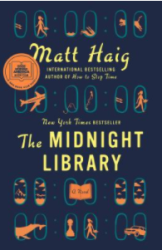
I strongly recommend this book. It is very interesting, there are so many topics that can be evaluated regarding the main character Nora Seed and how she appreciated her life, people, friends, lover, opportunities (mainly opportunities) and how the "Boat of Opportunity" can pass again in this in between place called " The Midnight Library". Nora represents in many aspects, when a person reaches the lowest point of her / his life, with lack of hope, depression maybe and when as a person you fell unwanted or unappreciated, however there are always opportunities to correct your path. She had so many versions or opportunities to choose a life that can suit her completely, however those versions did not give her that sense of "ownership" and many were "good " lives, (almost ideal), she felt in that way (i.e. Marriage with Ash and a completely family).
The narrative is very light.- The introduction of topics like Quantum Physics, traveling between this kind of "dimensions" provide certain explanation to the situation that she is experiencing. I think that the main message will be that: We as human beings need to pay attention to the small things that are around us and that forms our lives which are very important. Don`t waste your life, try to life as possible, take opportunities and enjoyed but the only way to enjoy is by living it fully and learning and deciding and making yourself ready to take control of your life and decide to live it as "full" as you can.
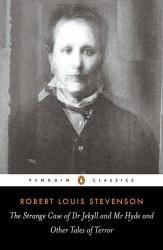
The Strange Case of Dr. Jekyll and Mr. Hyde by Robert Lewis Stevenson is a novel about a scientist in London, Dr. Jekyll, that has the misfortune of having to control and mask his alter identity, Mr. Hyde. After some unfortunate events partake, others begin to realize that the wise Dr. Jekyll has an alter identity. This novel has an unpredictable ending that left me stunned. I thought that the book was really good due to the continuously moving plot and the amazing characters that create a wonderous mystery throughout the book. I was required to read this book for school and I would definitely recommend it for readers that are in middle school and beyond that enjoy a great science fiction or mystery novel. Reviewer Grade: 9

The Strange Case of Dr. Jekyll and Mr. Hyde by Robert Louis Stevenson is a novel about a scientist in London, Dr. Jekyll, who struggles with controlling his alter ego, Mr. Hyde. As he attempts to mask his other personality, horrifying events occur that present the horrible personality of Mr. Hyde. Other citizens begin to discover the connection between Dr. Jekyll and Mr. Hyde as the novel finishes with a jaw dropping climax and resolution. I was required to read this book for school and I would recommend it for readers middle school and above. I really enjoyed the progression of the plot and the ending that was unpredictable. Reviewer Grade: 9
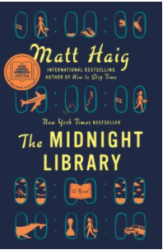
‘Between life and death there is a library,’ she said. ‘And within that library, the shelves go on for ever. Every book provides a chance to try another life you could have lived. To see how things would be if you had made other choices . . . Would you have done anything different, if you had the chance to undo your regrets?’-Matt Haig- The Midnight Library is a fantasy novel, written by Matt Haig and published on 29 September 2020 by the editorial Penguin Publishing Group. This novel was an instant bestseller and a BBC Two Between the Covers Book Club pick and was winner of the Goodreads Choice Award for Fiction 2020. The Midnight Library is a book about life and its ending, focusing on the choices people make, how these affect them and how they regret so many things throughout their lives, always wishing they could undo the mistakes they made, which in real life is impossible, but in the Midnight Library this is a totally different story. It is fundamental that in life you have a passion, something you live for, something that makes you wake up every single morning, something that makes you feel enthusiasm, something that gives you happiness and something that fuels your heart.
Nora Seed, a 35 year old woman from Bedford, England, decided to kill herself. Twenty-seven hours before she decided to die, she sat on her sofa scrolling through other people’s happy lives, waiting for something to happen. Nine and a half hours before she decided to die, she lost her job. Nine hours before she decided to die, she received a text from a loved one telling he wanted to talk with her, something she did not do, not because she didn’t feel things for him, but because she did. Eight hours before she decided to die, Nora entered a newsagent, where she saw a magazine with a black hole and she realised that was what she was. Seven hours before she decided to die, she had no one to talk to, so she texted her friend Izzy, even when things had dried up between them, and she didn’t get an answer from her. Four hours before she decided to die, Nora passed her elderly neighbor and she comprehended that no one needed her and that everyone would be better without her in their lives. Two hours before she decided to die, Nora was regretting almost everything she did in life; she opened a bottle of wine and left her brother a message telling him how much she loved him and that nothing was his fault, he couldn’t do anything. It was twenty two minutes past eleven and the only thing Nora knew was that she didn’t want to reach tomorrow. She took a piece of paper and wrote her last letter, her suicide note, where she explains that she blew all the chances she had in life, that if she felt it was possible to stay she would had, but this wasn’t the case, and so she couldn’t because she made everyone’s life miserable. She took an overdose and faded away. At 00:00:00, she woke up at a place that looked magical and she found her school librarian from her younger days in Bedford, Mrs Elm. This old woman explained to Nora that between life and death there was a library, full of books that provide the possibility to try another life they could have lived. In this way, Mrs Elm became Nora's imagined guide through the Midnight Library and the wonderful and unexpected things that happen throughout this story.
Nora Seed was a woman who had everything to make her life great, but she didn’t because of her outstanding depression and anxiety, the reason why she decided she didn’t want to live anymore. Joe Seed is Nora's brother, an extremely talented musician who struggled with addiction. Mrs Elm is the librarian from Nora’s school, 19 years before Nora decided to die they had a conversation about the future and all the possible lives ahead of her. Dan is Nora’s ex-fiance, which she loved and regrets not marrying.
From my point of view this book has a strong and meaningful lesson, and it is that the average human being spends their life regretting every wrong move they made. This drains their energy, and is not worth it because instead of worrying about things that you clearly can’t undo, you should be focusing on learning about your errors and put all you have on being better everyday, understanding that everyone makes mistakes and the most important is to keep going and never look back, only forward.
I recommend this novel to everyone that is struggling with mental health issues, because it can help you to appreciate things and it can also teach you many valuable lessons, such as finding your purpose in life so you can actually enjoy it. As well, this is an inclusive publication, taking in consideration that Nora’s brother, Joe, is homosexual. I enjoyed all the fantasy this book has, reading this is like travelling to the Midnight Library, feeling all the powerful emotions that take place there, and lastly but not least, connecting with every character’s story. The main lesson that this awesome book gave me is that it is ok to get lost, as long as you find your way back; and also there is people that are all the colors in one at full brightness, but some situations in their lives can turn them off, that’s why you should always be there to support your loved ones.
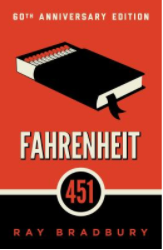
"Fahrenheit 451" is a short story that tells about Montag's transformation from finding a pleasure in burning books, to loving books and all the knowledge that comes with it. Montag lives in a society where the government has forbidden to read books and seek knowledge through writing. Montag is part of a group called "Fireman" who are supposed to put out fire, but that's not the case since they do the opposite. He lives with his girlfriend and has a bad relationship with her. They don't really talk and just look after themselves. Deep down, he cares for her, we'll find out when Montag gets home and see she's fallen over because of an overdose, where he called the ambulance and the police. At the end of Fahrenheit 451, Montag escapes the city and joins a small community of survivors who have successfully fled the repressive society and are dedicated to memorizing books. The group is moving north to start anew, and for the first time in his life Montag has a future to look forward to.
The short story is one of the few books I find interesting. Usually, I do not read many books and definitely not with the genre "dystopia". If you compare this short story to the society we live in right now, you can see they are opposite to each other so for me it is very interesting to hear how the people in "Fahrenheit 451" were dehumanized. The introduction was very boring, but the further you got into the short story, the more interesting it became. In the end, someone was really good. I still think this short story is relevant to us today because it proves what good conditions we live in, and I certainly appreciate more the privacy and freedom I have. "Fahrenheit 451" has a lot of themes, such as the power of books, because you can really see how much a book can have meaning. All the power a book may have manifested in this particular short story. There are also other themes, such as, Loss of Individuality, Role of Technology and ignorance and Knowledge. All these themes have an important meaning in this short story.
After I read this book, I was trapped by the dystopian world and all the social problems they had. I wonder a lot what our society would look like if the government had banned reading books, would I have read this?
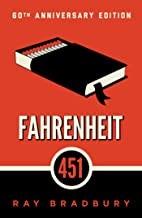
Fahrenheit 451 by Ray Bradbury is a dystopian novel about Guy Montag; a firefighter in a world that has illegalized books. His occupation results in burning books that are found in citizens' homes and after witnessing a woman that was burned with her books after refusing to leave them, Guy has a disturbing realization of his society. The progressive plot gave me the excitement of coming home and reading while the ending left me in a jaw dropping manner. I thought that the book was amazing due to the mysterious plot and the relations it has to our world today. I had to read this for school and thought it was going to be boring, but in the long run it became one of my most favorite books I have ever read and I would definitely recommend it for readers who love dystopian novels. Reviewer Grade: 9
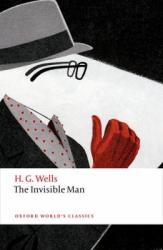
The Invisible Man by H.G. Wells is a science-fiction novel about a man in England in the 1800s who creates a way to make himself completely invisible without a way to change it. The life of a scientist named Griffin, who uses his invisibility for harm, is described throughout the book with an unpredictable ending. I selected this book for a school report, but I would definitely recommend the book to read if wanting a novel that keeps you on edge and wanting more. I thought that this book was pretty good due to the mysterious plot and ending though there were some dragging parts. I believe it is worth the wait for the surprising ending that left me in shock.
Reviewer Grade: 9

"The Invisible Man" by H.G. Wells is a gothic literature novel about an albino man in the 1800s who turns himself invisible. The book follows his journey through England as he commits a multitude of crimes and inevitably gets caught and killed. I didn't like reading it because I felt it was boring, and it was hard to keep reading since I had a strong dislike for the main character. Despite not liking the novel, I read it for school during our gothic literature unit, and it is a good example of gothic literature. "The Invisible Man" isn't surprising but rather shocking because the invisible man's actions are so abnormal. It could be relatable if you were wronged by someone or something and want to take revenge on them. It's not one of the best books I've read this year.
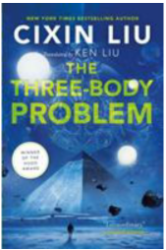
A few years ago, someone suggested that I read the Remembrance of Earth's Past series, so of course, I added it to my Overdrive wish list so I could eventually listen to the audiobook. I'm usually down to read some hard sci-fi since it's a niche genre I enjoy. I was intrigued that this book came from China because I don't usually think of hard sci-fi when I think of that country. In fact, I hardly think of literature that wasn't written hundreds of years ago.
It's been about five months since I read this book, so this review is a long time coming. I still vaguely know what this book was about and what science was explored within its prose, but that's about it. Nothing stuck with me other than the sense that it was a bit of an Ender's Game ripoff. I would have liked to connect with the characters a bit more, but The Three-Body Problem seemed too bogged down in trying to get its complex science across to spend enough time creating characters that I liked.
Ultimately, much like the Broken Earth trilogy, I can understand the hype this book had received, even if it didn't fully grab me when I listened to the audiobook. I'll continue this series if for no other reason than it presented an interesting idea that I'd like to see to completion. Perhaps the fact that I'm listening to a translation of the original Chinese story is what's reducing some of my enjoyment of this book, which isn't necessarily the book's fault. I think the world is big enough for other non-Anglo cultures to tell stories like this, and for this reason alone, I would recommend fans of hard sci-fi at least give The Three-Body Problem a chance.
Interesting hard sci-fi concepts from China, I give The Three-Body Problem 3.5 stars out of 5.
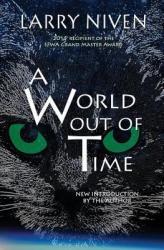
I’m starting to realize that science fiction in the 1970s might need to stay there. While there was a lot of progress in the genre past the golden era of the 1950s, many of these books are unfortunate snapshots of a time that has not aged well. Similar to Ringworld , I found A World Out of Time to rely heavily on the sexism that runs rampant through 1970s sci-fi. Additionally, while the hard science presented in this book was generally plausible, the way it was presented was so dry and dense as to make it more of a Ph.D. thesis than an entertaining read.
On the plus side, A World Out of Time explores many scientific ideas that were well ahead of its time. Aside from the normal sci-fi tropes of mind implants and artificial intelligence, this book also deals with climate change in a way that hasn’t been felt until now. Granted, it blames this extreme change of the Earth’s environment on the sun and less on the humans who inhabit it, but the thinking about what would happen to our planet if such a thing were to happen was thorough enough to be believable.
Despite these forward-thinking ideas, A World Out of Time treats sex and drugs as inconsequential parts of life in the future. It’s clear the culture of the 1970s influenced this part of the book, but it feels so outdated compared to today’s standards that it was difficult to read without rolling my eyes. Sure, it’s probably less prominent than the pulpy science fiction stories that came before it, but the fact that the author felt these things needed to be included tells me more than I need to know about him.
A dry hard sci-fi novel that hasn’t aged that well, I give A World Out of Time 2.0 stars out of 5.
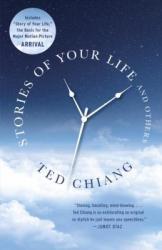
After reading Exhalation , I found myself in search of more stories by Ted Chiang. This led me to Stories of Your Life and Others. Partly because this collection included many of Chiang’s earlier stories, not all of them were great pieces of literature like the ones in Exhalation. I could tell that Chiang was still trying to find his voice as a writer as he explored many science fiction topics common to the genre. While not all of the stories are fantastic, there are enough good ones to warrant reading this collection.
What’s a little disappointing is how some of the ideas Chiang explores in this book are truly interesting topics, but the execution of these stories feels a little too erudite for the common reader. I appreciate Chiang’s later ability to humanize these ideas (as shown by my love of Exhalation), but he just wasn’t quite there yet with these early works. Still, there are a handful of award-winning stories in this book, including “Tower of Babylon” and “Hell Is the Absence of God.” Chiang’s ability to combine science and religion is second to none, and these stories prove as much.
One story in this book stands out from the rest. It makes sense that “Story of Your Life” was the titular choice for this book. For those unaware, the movie Arrival (2016) is based on this short story (and is a pretty close adaptation). Even if you only read “Story of Your Life,” I think you’ll get something out of this collection. It is by far the most approachable of these stories, and it deserved all of the awards bestowed upon it when it was originally published in the late 1990s.
A good collection of Ted Chiang’s early works that contains a few sparkling gems, I give Stories of Your Life and Others 4.0 stars out of 5.
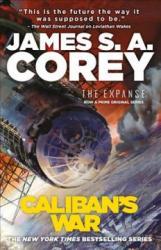
One of the things I like about James S.A. Corey’s Expanse series is how these books focus on the crew of the Rocinante. Many hard sci-fi writers try to show how smart they are by making it obvious how much math they did to explain how their sci-fi universe works. While The Expanse certainly has these moments, they’re fit in between the human drama that follows James Holden and his crew. Trouble seems to follow them wherever they go, and in Caliban’s War, they’re pulled into a political conflict that spans the solar system.
I appreciate how an overarching plot with the protomolecule connects Leviathan Wakes to Caliban’s War. While the first book in the series took some time ramping up into having a cohesive collection of characters, Caliban’s War uses all four members of Rocinante’s crew in a new way that felt more interesting. Of course, this book also contains my favorite “character of the day” with Chrisjen Avasarala as the U.N. ambassador. Her calculated political ambitions were fun to watch as they unfolded, and she tried to keep on top of all the chaos that was happening.
Caliban’s War also benefits from plenty of action and tense moments. What could easily be confusing and hard to follow was well written and engaging. My heart was racing as these exciting sequences took the political drama and made it explode in a way that was both expected and fun to read. Ultimately, the emotional connection to the characters—both continuing from book one and exclusive to this book—is what made everything click for me in this novel. Granted, I would have liked a little more continuity between the two books by bringing over more characters from Leviathan Wakes. Still, sometimes a long-running series has to focus on bite-size stories instead of carrying a huge and unwieldy plot throughout.
An exciting, political, and action-filled hard sci-fi gem, I give Caliban’s War 4.0 stars out of 5.
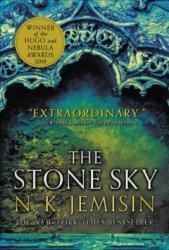
I have to say I’m a bit disappointed with The Stone Sky. It took me some time to get used to the way the author wrote the Broken Earth trilogy, but by the end of the second book, The Obelisk Gate , I had bought into the premise. The fact that this book had a lot to live up to with the foreshadowing presented in the second book might be why I’m disappointed with the result. After all, I was looking forward to some epic moments involving the moon, which didn’t seem to materialize for me. Now that I’ve finished this trilogy, I’m starting to wonder if the reason it didn’t quite fully click for me was because I was reading it via audiobook. There seemed to be a lot that I missed that would leave me confused about who the characters were, what they were doing, and why they were doing it. Perhaps if I had dedicated time to focusing on these audiobooks instead of listening while I was doing other things, I would have liked the series more. As it stands though, I probably couldn’t tell you what the point of this book was without going back and rereading it.
Ultimately, the Broken Earth trilogy is well written. The language might be a little too poetic at times and the fantasy setting introduces a lot of terminology that was difficult to keep track of, but I can see the appeal of it. The magic system is truly unique, even if the explanation for its origins made less sense than if it was just an unexplainable magic force. I do appreciate that most of the loose ends were wrapped up and either explained or made into moot points by the series’ conclusion. And while the resolution of this trilogy felt a little cliché, at least it provided an ending that most would come to expect from this type of sub-genre.
A pretty good trilogy wrap-up that might need a second read-through, I give The Stone Sky 3.5 stars out of 5.
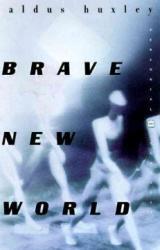
Brave New World by Aldous Huxley is about a futuristic society that revolves around conditioned people. People are made by machines that condition them emotionally and physically for a certain job. Since people are conditioned to perform certain tasks they are happy and content. This book follows Bernard who actively questions the system and is unhappy. Throughout the book, it brings up the question of whether it is better to have an orderly and perfect society or for people to have emotions and free will. Aldous Huxley does a wonderful job of building a world where individuality is erased. The book was an interesting read and would give it a 3 out of 5 stars.
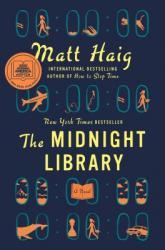
I expected this book to be decently interesting but I found that I couldn't put it down and ended up finishing it in a day. It tells the story of Nora Seed, who, after taking her own life, finds herself in the "Midnight Library," in which every book is a different life that could have been hers had she made a different decision in any given moment. She explores several of these lives, trying them out, in an attempt to find the right one that she really wants.
Nora is a relatable, three-dimensional character with an arc of development that was touching and well-done. The development of the book's themes, too, was immaculate, and they were crafted and portrayed in a way that hits the reader hard. If you're looking for a heartfelt book about self-discovery, regret, potential, and the joy of life, I would highly recommend.
Content-wise, there's the occasional swear word, and two mentions of the main character having sex, but it wasn't described and there wasn't anything graphic. I'd probably give it a 14+ age rating.
Reviewer grade: 11
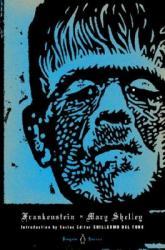
Mary Shelley’s Frankenstein, published the year she turned 20, marks the beginning of one of the 21st Century’s favorite genres - science fiction. Written as a series of letters, the story is narrated by an explorer who encountered and rescued a scientist in the far north of Europe. He recounts an adventure told by the mysterious scientist, Victor Frankenstein, who had been fascinated by mysticism and modern science since childhood. Destroyed by grief from personal loss, Frankenstein spent his adulthood constantly occupied with experiments. The experiment that brought him near death and freezing to a stranger's ship had toyed with human life as we know it.
The book follows this experiment and Frankenstein himself as they goes through grief, excitement, devastation, apathy, loneliness, and fear. Mirroring experiences Shelley had gone through in her own devastating adolescence, Frankenstein is an achingly heartfelt book to feature such an absurdly impossible plot. This combination illustrated by such a talented author makes for an excellent book, and allows readers to experience a story that has deservedly become a hallmark of modern literature.
Note: For a book written by a woman, there are shockingly few female characters, and seemingly none with importance to the plot. But readers must remember - such gifted writers do everything for a reason. I would recommend looking into the moon as a symbol for maternity, and to the lack of female characters as an element that relates to the chaotic cycle of the story. This book is often a required part of high school curriculums, and therefore includes powerful themes that rest just behind the inherently dark storyline.
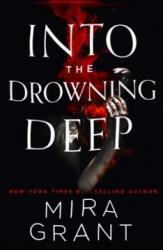
I was viewing some of the recommended books in the PPLD website and I
found this book. The title seemed suspenseful and interesting, and it drew me
in, so I decided to read this book. It's about mysteries wanting to be
discovered and uncovered. Years ago, the "Atargatis" filmed a documentary
about bringing ancient life back and discovering mythical creatures. It was
all going fine until the crew disappeared- and what's weird is how footage of
the crew getting slaughtered by mermaids got leaked out. Because of this, the
public grew suspicious and began to wonder if this was just to mock. Because
of this, Theodore Blackwell is curious and forms a new group of people to
voyage to the Mariana Trench. Each person in the crew has their own specialty
and has their own reason of wanting to explore the same area. Along the way,
they discover that a lot of the "myths" are true while finding fheir way to
safety.
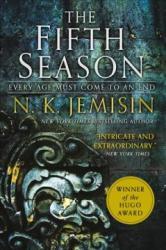
In the post-apocalyptic Stillness, where nothing is Still, N. K. Jemisin creates a cast of interconnected characters, an intriguing plot, and a fantasy world that masterfully entails factions, a magic system, and history that is weaved into the current time of the book. Jemisin goes through three different perspectives, but still maintains a sense of total engagement and interest for the reader. We follow the stories of these three, and with each learn how much of a curse each blessing can be. This series is very real and doesn't shy away from concepts that would be expected from societies in such a situation, but at the same time, is surprising in a number of ways. I really enjoyed this book; I gasped internally several times throughout, from plot twists, reveals, and realizations, and enjoyed almost every part of The Fifth Season.
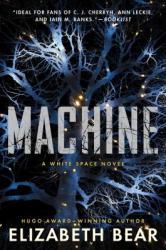
Machine is a sci-fi space opera set in the same universe as Ancestral Night, but with completely new characters and a new writing style. It revolves around a trauma doctor, LLyn, a specialist in search and rescue. Her body has a flaw, however. She deals with nerve-drilling pain, a side-effect of living on a backwater planet with no medicine, and relies heavily on an ai-driven exo that supports her and hides her pain. When an assignment brings her to the far reaches of space, she discovers a relic of the ancient Earth. A generation ship. Sent when earth was thought to have no hope of survival, this relic has drifted across space a time, with all of its crew in cryo-sleep, and its shipmind ravaged and torn by conflicting imperatives. This book is a great read for lovers of sci-fi and mystery.
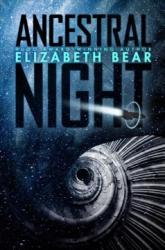
Ancestral Night is a book set in the far future, where our equivalent of supercomputers are built into people's brains and alien races have made a siblinghood with Humans. This book follows a salvage specialist that uncovers an ancient spaceship that mysteriously malfunctioned and then vented the crew into space. When she discovers who caused it, how it was caused, and why it was caused she is deeply disgusted. I enjoy this book because of the feel of Sci-fi that is real, and the mystery of the ancient races lost to time.
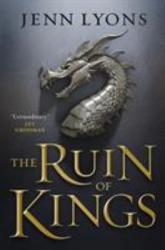
The Ruin of Kings by Jenn Lyons is an amazingly crafted fantasy story following a young boy named Kihrin as he discovers the secrets of a world filled with gods, demons, dragons, and mages. However, Kihrin finds that his past will come back to haunt him, and he must survive with the help of anyone who will accept him. Including, but not limited to, gods, dragons, and deposed kings. The plot twists and amazing scenery make this book amazing. I enjoyed reading it very much, and would recommend the book to anyone who enjoys fantasy novels.
Reviewer Grade: 11
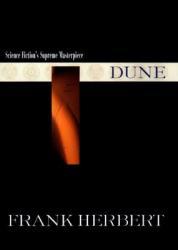
Frank Herbert’s Dune is one of the most iconic science fiction novels of all time. Featuring an imaginative universe filled with strange aliens and even stranger planets, Dune provides a sense of adventure and wonder to every reader. It follows the story of a young noble as the Emperor gives his family control over the planet responsible for generating the most valuable resource in the universe, spice. But this advantageous appointment is not without its risk, and soon rival houses come to try and take control of the planet. I would recommend this book to anyone who enjoys any kind of science fiction, and it is a must read for every Star Trek and Star Wars nerd out there.
Reviewer Grade: 11